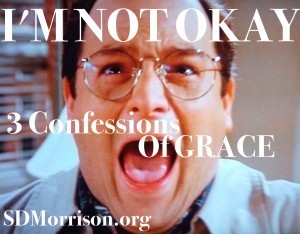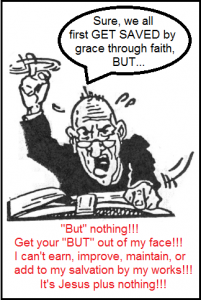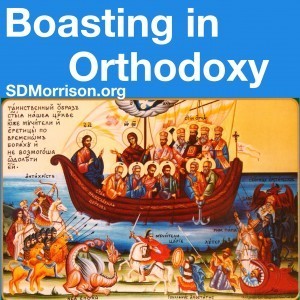Stephen D. Morrison's Blog, page 17
July 23, 2014
Are You From Satan’s Church?
 Are you from Satan’s church?
Are you from Satan’s church?
It seems like a silly question, but according to a well known American pastor, if you support gay marriage, you are. In fact, you “belong to satan” he says.
This, my friends, is nonsense.
Christianity has picked up a nasty habit. We’ve become professionals at kicking people out.
Professional stone throwers.
Do you disagree with someone? Well then, sadly, the popular thing to do is to excommunicate, alienate, and demonize them. This instance with the American pastor is far from abnormal.
Ironically, the word “Satan” actually means “accuser.” This pastor, in labeling fellow believers Satanic, is acting more like Satan than anyone else. Fundamentally, Satan is the accuser. Who, then, is acting more like Satan in this scenario?
Inclusion vs. Exclusion
Jesus has a lot to say to those who are quick to exclude those whom He has included. For example, in Matthew 19 Jesus makes a famous statement about letting “the little children come to me.” Reading this in our culture you hear a cute statement about being like children. But if you understand the history, you’ll read a different story. Children, in ancient israel, were not treated kindly.
Children were the outcasts; the nobodies of society. They were seen as property, not as people.
Jesus was making a profound statement about inclusion here. In accepting the little children, Jesus accepted the culturally unacceptable, He included the culturally excluded.
Jesus stood for inclusion, not for exclusion.
“The name of Jesus, whose life and message resonated with acceptance, welcome, and inclusion, has too often become a symbol of elitism, exclusivism, and aggression.” – Brian McLaren
What would Jesus do in the face of this blatant exclusion, the slanderous accusation from a mega-church pastor? Would He stand on the side of the accuser, or of the accused?
If we take the life of Jesus seriously, we cannot stand on the side of the accuser. I believe instead we must become the most inclusive, accepting, and loving group of people on the planet. Rather than throwing accusations and playing satan, we will be Christ-like by loving, accepting, and including the outcasts; the nobodies.
If you’re standing on the receiving end of this pastors accusations, hear this. If you follow Jesus, you are not from Satan’s church. Don’t let the fame of one man be the mouth piece of satan towards you.
You’re not from satan’s church until you start picking up stones.
What are you thoughts about this? Let me know, comment below!
Like this article? Help me expand my reach by sharing:
July 16, 2014
Unreality

Thomas Merton writes that “there is no greater disaster in the spiritual life than to be immersed in unreality.” 1
When I first read this statement, I wasn’t sure what he meant. But as I’ve pondered it this week, the beauty of it has become clear.
Living in reality, in the here and now, is central to a spiritual life in union with Christ.
Christ is not outside our existence, He is living, active, and present in the world we live in.
To live life in Christ. therefore, is to live a life truly present today, alive in Him.
To live life in Christ is to see Jesus in all things, in all people, and in all events.
Jesus Christ is the all in all. 2
“Jesus lived the ordinary life of the men of His time, in order to sanctify the ordinary lives of men of all time. If we want to be spiritual, then, let us first of all live our lives.” 3 writes Merton.
The question then is, how are we to escape from unreality, and to truly live in reality? How are we to be fully alive?
Waking up to Reality
I’m learning what this means myself. I’m learning how to live in reality, to see Christ in everything, and therefore, to be truly alive in Him. Here are a four ways to discover reality flooded and filled with Jesus.
1. See Jesus in all
Be active to see Jesus in all people. When you walk on the street, see Jesus in those you pass by. As you work your job, see Jesus in your co-workers. Find Jesus in the lost, the hurting, the broken, and the mundane. 4 See Jesus in all.
2. Unplug
This is a challenge for me. At times, I can be a social media addict. But for the last few months I’ve intentionally tried to stay away from all technology for at least the first hour of waking up. I find that I am less reactionary and more proactive and aware of reality when I do this. When I simply be not always do, I find reality. Unplug, therefore, and wake up to reality all around you.
3. Pay attention
Pay attention to what’s happening. Notice details. Sit outside and listen to the birds. The world is a wonderful place filled with awe inspiring moments of astonishment if you will just sit and wait for them. There is beauty everywhere. There are hidden treasures of delight in all things, just waiting to be discovered. Pay attention.
4. Savor silence
Enjoy silents. Feel the simplicity of life. The rhythm of your breathing, the beating of your heart, and the cool breeze of the day. Sit and just be. There’s no hurry. There’s nothing more important than the simple solitude of sitting alone with God. God is in the silence. Savor silence.
What does unreality mean to you? How can you find reality? Leave me your thoughts below!
Like this article? Help me expand my reach by sharing:
Notes:
Thoughts in Solitude P. 17 ↩Col.1:17 ↩Thoughts in Solitude P. 46-47 ↩See Matthew 25:35-40 ↩July 11, 2014
What if Hell Didn’t Exist?
 This is a hypothetical question. There’s no need for it to get out of hand. I am certainly not a universalist.
This is a hypothetical question. There’s no need for it to get out of hand. I am certainly not a universalist.
I just want you to think about this question. “What if hell didn’t exist?”
Think about it. If Hell didn’t exist, how would that fact effect the way you 1) live your life, 2) make your friends and 3) preach the gospel?
Hypothetical or not, this is an important question. I believe it reveals a great deal about our belief system. In my mind, the Western church has become far to hell-focused, and far less Jesus-focused. Therefore, in asking this question I hope to assess (and hope that you do this as well) how much of this is true for me.
Here is my perspective in these three areas of inquiry.
If Hell Didn’t Exist…
#1 …How would that effect the way I live my life?
To be honest, this probably would effect my life. I would not stop preaching the gospel, nor would I stop dedicating my life to God. I would, however, think differently about my life.
And if I’m honest, it would be in a positive way.
I think my life would be filled with less stress and worry, and more peace and calm. Why? Because I wouldn’t live in constant fear of my friends, family, and acquaintance’s getting tossed into an eternal barbecue.
While I don’t I live in reaction to hell, I do live effected by it. On some level that’s a good thing, although I don’t believe hell to be a motivation for evangelism. Instead, I seek to live my life in reaction to the majesty of Jesus Christ.
I don’t think our focus in life should be on hell, or on preaching hell to convert people. I think our focus should be on Jesus. The magnificence of Jesus, the goodness of the Gospel, and the joy of salvation. This should overwhelm our lives. Hell, at best, is an afterthought. Jesus Christ is our magnificent obsession.
#2 …How would that effect the way I make friends?
To be honest, most of my friends are believers. Which as I’ve come to study the Gospel more, I’ve come to feel truly ashamed of this fact. Jesus was a friend of sinners, why am I not?
My wife, however, is awesome at this. So let me brag about her.
She inspires me tremendously with how selfless her love is for others. She loves and accepts people for who they are! not for the purpose of “converting” them or changing them. She is a genuine friend, who cares about the people in her life.
She inspires me. Of all the people I know, my wife is probably the best at genuinely loving well. Which ultimately, is what we’re called to do: love. Simply, love others.
I think we need to get ahold of this, too. Christians for far too long have lived in a “holy huddle.” But shouldn’t we be an inclusive group of friend-makers? Shouldn’t we be calling people in rather than making lines as to who is out. I mean, if we are serious about following Jesus, we should start acting more like Jesus (profound, I know). What did Jesus spend most of His time doing? Being a friend to sinners! Including the least of these, loving them, and accepting them!
#3 …How would that effect the way I preach the gospel?
 About six years ago, if you’d asked me to preach the gospel without hell, I would have laughed and said, “Impossible!”
About six years ago, if you’d asked me to preach the gospel without hell, I would have laughed and said, “Impossible!”
I was a “hyper-hell-fire-preacher.”
But today—thank God!—I have moved passed my fire-and-brimstone days. While I did learn a lot from that season, I also now see in retrospect that my motivation was not always love. I preached to achieve a certain religious goal, not because I actually cared for people.
When our gospel is a kind of fire-insurance, rather than a Jesus-introduction, we have a serious problem! The Gospel is not good news because we escape hell. The Gospel is good news because it means enjoying a relationship with God! God! The good Being, the happy Father, the delightful dance of love. That God is a good God, and that God is what makes the good news good.
The Gospel is good news because the God of the Gospel is a good God! It is not about avoiding hell, it’s about enjoying Jesus!
For me, this is essential. If hell did not exist, I would still preach the Gospel! Why? Because hell or no hell, everyone needs Jesus! Not in a threatening way, as in, “you need Jesus or else!”, but because life with Jesus is the best life. What greater joy is there than to be included into the Trinitarian fellowship of Father, Son, and Spirit? What greater freedom is there than to be fully accepted, loved, and embraced in Christ?
That’s what makes the good news good, and that is why I preach it!
So what do you think? If Hell didn’t exist, would you still live the way you do, make the friends the same way, or preach the Gospel? Let me know, comment below!
Like this article? Help me expand my reach by sharing:
July 8, 2014
Is America a Christian Nation? (7 Facts to Consider)
 Is America a Christian nation?
Is America a Christian nation?
It’s a question I’ve been asking myself a lot, especially this week. Coming back from a July 4th weekend, where patriotism is often mixed with Christianity, it’s easy to wonder.
I think this is an important question to answer. Biased, un-factual assessments won’t do here.
So what are the facts?
Seven facts to consider
#1 We spend 700 billion dollars on the military. (See Matthew 5:44. Do we follow Jesus here? Is a big military the same as “loving” our enemies?)
#2 We have a 15% poverty rate. (See Matthew 25:34-36. Do we see Jesus in the poor and needy?)
#3 We are founded upon the idea of religious freedom, not of Christian freedom. (A “Christian nation” goes against the original vision of the founding fathers for the right to religious freedom. A national religion negates that freedom, or at best oppresses others. Therefore, Christian freedom was never exclusively the point. General liberty was.)
#4 We have one of the highest crime rates in the world. (Crime is a tangible expression of social unease and injustice.)
#5 Most of the Founding Fathers were not Christians, they were Deists. (Christianity is similar to Deism, in that they both use the name Jesus. However, Deism is anti-Christian in its rejection of Jesus as divine, along with the miracles of Jesus, and the resurrection of Jesus. Therefore, our foundation is not Christian. If anything, it is non-Christian or anti-Christian in its inherent Deism.)
#6 Deism is moral, but does not follow Jesus. (Deism rejects Jesus as divine, and instead follows an abstract vision of “god” with moral codes and rules. While sometimes appearing “Christian,” Deism is fundamentally not Christian in that it does not set to follow Jesus above all else.)
#7 The 1796 Treaty of Tripoli states clearly that the United States is “not in any sense founded on the Christian religion.” (Written under George Washington, and signed by John Adams, this treaty clearly states that America is not a Christian nation. Source: article 1, direct quote.)
Conclusions:
Either a) something is not working with our “christian” nation, or b) we are not a Christian nation. a) Could be due to a faulty understanding of Christianity, and therefore a lack of Christian teaching, but I think it is more likely true that b) is the case. I believe that we are not a Christian nation at all, but rather, a nation that happens to be predominantly Christian, built upon Deist values.
There may be morals in Deism that appear similar to Christianity, but following morals is not the same as following Jesus. Our military budget and lack of serious care for the poor is a clear sign that while we may be founded upon moral ideas similar to Christianity, we are not, nor have we ever been, a nation dedicated to following Jesus. Therefore, I think it’s important to see that America is not a Christian nation.
And that’s a good thing.
We don’t need to legislate Christianity. We don’t need to moralize the country. We need to preach the Gospel. We need grace. Whenever I hear the drive to take back our nation, and return to our national roots, I question what those roots are? Moral, legalistic obedience to a set of rules (ever if they are the 10 commandments)? I sure hope not.
If we want to be a Christian nation, we have to preach grace, love, mercy, justice, and most of all, the good news of Jesus Christ. I think it is irrelevant whether or not America is a “Christian” nation. What I think matters, however, is what we do as human beings living in this country.
Yes, I love America. But no, I do not think it is some sort of second elect Israel, another nation of God’s “chosen” people. Our responsibility is not to “take back our nation” but to preach the gospel. Political indoctrination, and gospel proclamation are not one and the same!
So what do you think? Let me know, comment below!
Like this article? Help me expand my reach by sharing:
July 3, 2014
I’m Not Okay: 3 Confessions of Grace
 Can I be real with you for a minute? I don’t have my life together. I’m not “okay.”
Can I be real with you for a minute? I don’t have my life together. I’m not “okay.”
I get mad. I mess up. I say things I regret.
But… that’s okay. At the end of the day, grace triumphs over my mistakes.
I know I’m not the only one who can feel this way sometimes.
I believe vulnerability brings freedom. So here are my confessions of grace:
#1 I am an un-gracious, grace-enthusiast
As a self-proclaimed “grace-enthusiast” I can be one of the most un-gracious guys around. I can be grumpy, irritated, and rude. I can be impatient, angry, and sarcastic.
It’s okay to be okay with not being okay!
Sadly, we have the habit of wearing masks. We wear masks to hide.
But the only way to freedom, is to throw away our masks.
If our Gospel creates masks, then we are not teaching the Gospel correctly. The Christian message is a message of freedom.
We are free from mask-wearing, faking perfection. We are free from performance.
People pleasing, God pleasing, and mask wearing has been the fruit of the Gospel for too long. It’s time for a Gospel that give freedom to be real, genuine, and vulnerable.
#2 Grace: permission not to be okay
We need permission not to be okay.
So here it is. You are allowed to fall apart. You are allowed to break down. You are allowed to not be okay, not to be happy, not to be “a good Christian.”
Not because we should be hard on ourselves, or expect failure. Rather, because vulnerability brings freedom and healing.
Be okay with not being okay. Sometimes that’s all it takes to get over being not okay.
Don’t put up walls. Don’t hide your true feelings. Because if you do, you will never experience the healing you need.
Vulnerability is healing. Holding pain inside, putting on a strong face, is only making things worse.
Yes, it’s scary to open up. It’s terrifying to be real.
But if we want freedom, real freedom, we must be vulnerable. We must be okay with being fully ourselves, even if who we are is not so nice. In order to be healed and free; we must be real, open, and vulnerable.
It’s okay to not be okay. You have permission.
#3 “My life” is an oxymoron
If you’re holding onto the end of your rope, here’s my advice: let go. You’re holding onto the wrong rope.
Your life is not your own.
“My life” is an oxymoron (a contradiction). There is nothing about your life that is yours.
You belong to God.
He holds you, guides you, and accepts you right now as you are. You’re very existence is a gift from God; a testimony to grace.
I am the most stressed out when I’m holding onto my life the hardest. When I get me focused, I loose sight of grace.
Grace means Jesus is the center of everything. He is the driving force behind all that I am and do.
I trust Him, therefore, by letting go of my life. If you’re trying to make your life work, that’s the problem. You can’t.
He can, and He will. It would be much better if you’d just loosen up on that death grip you have on your life and let Christ take care of everything.
Finding safety
May you be okay with not being okay.
May you give yourself permission to be vulnerable.
And ultimately, may you trust that your life belongs to Christ, and that He is pretty darn good at taking care of it.
There is safety in surrender. There is freedom in failure. There is hope for healing.
Jesus takes your life, imperfect as it is, and He makes it beautiful.
Let Him.
How does all this make you feel? What does it mean to be vulnerable? Let me know, comment below!
Like this article? Help me expand my reach by sharing:
July 2, 2014
Grace: His Performance > Yours
 Religion says “do” the Gospel says “done!” At the heart of the gospel you will find the final cry of Jesus on the cross: “It is finished.”
Religion says “do” the Gospel says “done!” At the heart of the gospel you will find the final cry of Jesus on the cross: “It is finished.”
Τετέλεσται, in Greek, meaning: it is finished, paid in full; accomplished fully.
In this one statement, Jesus sums up the whole scope of the Christian message. In this one statement, Jesus triumphantly declares His victory over sin and death. It is finished! Christ Jesus has taken up our cause, undoing our fallen condition, and bringing us back home to the embrace of His Father!
It is Finished!
We are saved by grace, not works. Everyone knows that. But what about after salvation? Is the Christian life a life lived by grace, or by efforts?
The Gospel tells us. We are not only saved by grace, we live our whole Christian life by grace! There is not a moment of our existence that is not upheld, perfected, or completed by anything other than grace. It’s all grace!
Sadly, most of the church is unaware of this fact. I know this first hand from my own life. I grew up living in an endless cycle of works. While I had known that I am saved by grace, I thought the rest was up to me. Wasn’t it my job to keep myself from backsliding, pursue a relationship with God, and try not to sin?
When I was in high school I would wake up every morning, sometimes as early as 4:30am, in order to spend my “devotional” times with God. If I didn’t wake up, or if I slept through my bible reading, I would spend the rest of the day beating myself up, feeling guilty for how I’d fallen.
I felt like it was my job to sustain my relationship with God. I knew that I was saved by grace, but the rest was up to me. My Christianity was about my self-efforts, not about Jesus.
When I discovered the good news that “it is finished,” it was like shock therapy! My works-based relationship with Jesus could no longer stand in the light of this newfound grace.
Grace means freedom from performance! Grace means that His performance in my name and on my behalf is more important than my striving. 1
I will admit, it’s easy for me to fall back into a routine of self-efforts. My goal in life is to daily learn grace: that I may grow in trust, relying fully on Jesus to help me in my daily life.
Grace means Jesus is central. Grace means that my relationship with God is no longer about me. Grace means that in Christ we have a finished work, a completed covenant, given as a free gift to enjoy.
Overcoming Performance
 Your performance is overrated! What you do does matter, but not nearly as much as what Christ has done for you, in your place.
Your performance is overrated! What you do does matter, but not nearly as much as what Christ has done for you, in your place.
It’s important as we learn to walk in grace that we learn to walk the fine line between performing for God, and performing with God. On the one hand, you have striving to earn something from God, while on the other hand, you enjoy co-labouring with God. 2
At the end of the day, no matter how successful you are: you remain unconditionally loved, and upheld by grace. Jesus Christ is the “Author and Perfecter of your faith” the “Begin and End, the Alpha and Omega.” 3
“It is finished” > Your performance
What do you think? How do you live the life of grace in the midst of a world of performance? Let me know, comment bellow!
Like this article? Help me expand my reach by sharing:
Notes:
Which is not to say that efforts are not important—I work hard to achieve my dreams!—but that grace takes precedence over my efforts. Ultimately, His efforts, His accomplished work, His grace, matters way more than my self-efforts, hard work, and striving. ↩See 1 Cor. 3:9 ↩Heb. 12:2 and Rev. 22:13 ↩July 1, 2014
Grace Wins
 So far today I have been called “satan,” a “false prophet,” and a “wolf in sheep’s clothing”—all before I had my morning coffee! After yesterday’s article on The Gay Prodigal Son, I have not been treated very kindly by some.
So far today I have been called “satan,” a “false prophet,” and a “wolf in sheep’s clothing”—all before I had my morning coffee! After yesterday’s article on The Gay Prodigal Son, I have not been treated very kindly by some.
It’s funny to me how quick people are to judge before they understand, taking no time to see my point of view or my point in writing things like this. But I’m not here to rant, or to complain about the feedback I get. Rather, I want to talk about grace: how why grace always wins, and how mercy always triumphs over judgement.
Grace Wins
Acceptance, mercy, forgiveness, and grace always wins over judgement, and condemnation. No matter how you wrap it up, even if you disguise your judgement under a twisted concept of “love,” you will still have to face the facts that love and grace win out ever time over condemnation and judgement.
Grace means accepting the unacceptable, forgiving the unforgivable, and lending kindness to the broken and hurting. I personally don’t know any people group who have been more hated and hurt by the church than homosexuals. It is for this reason that I write about homosexuality often. It’s not because I want to be controversial or because I want to make a political statement, I ultimately want to preach grace. In my mind, in our culture today, no where does grace shine the brightest than in the culture war of homosexuality and the churches response to it.
In the face of homosexuality, which is something I do believe is a sin, I believe that our response must be grace, not judgement trying to pass itself off as “telling the truth in love.” If you’re going to tell the truth, tell the truth that there is nothing you can do to keep you from the love of God. Tell the truth that there is no sin, no shame, no guilt that can keep you from the embrace and acceptance of the Father’s love for humanity.
God loves homosexuals! God accepts homosexuals! I emphasis this fact because I want to emphasize grace. No matter who you are, what you do, or what you believe, the God revealed in Jesus is a God who is for you, not against you.
Grace wins. Extending love and mercy in the face of judgement is always more powerful than speaking your version of “the truth.” What is the truth? The truth is not that God hates homosexuals. The truth is that God loves homosexuals, and that He welcomes them home into the embrace of His love.
Tell that truth!
Grace for All
Thankfully, even if I’m wrong here, even if I’m totally working against the will of God, there is still grace for me. That’s why grace is so amazing. No matter what there is nothing that can keep me, or anyone, from the arms of Our Father in heaven. He loves us, and He refuses to abandon us in our rebellion and sin. He meets us in our brokenness, bringing healing, love, and life. Nothing can separate you, me, or anyone from the love of God!
What do you think? How do you think the church should deal with issues like homosexuality? Let me know, comment below!
Like this article? Help me expand my reach by sharing:
June 30, 2014
The Gay Prodigal Son
 The Prodigal Son is perhaps my favorite of all the parables of Jesus. In connection with the parable of the lost sheep and lost coin, this parable trilogy presents pure, stunning, undiluted grace. But have we truly taken it serious?
The Prodigal Son is perhaps my favorite of all the parables of Jesus. In connection with the parable of the lost sheep and lost coin, this parable trilogy presents pure, stunning, undiluted grace. But have we truly taken it serious?
What if the prodigal son was gay?
Would the story go any differently, if, let’s say, it were retold through the mind of evangelicalism?
The Gay Prodigal
Let’s try it. If re-told according to the evangelical response to homosexuality, I think the story would go like this…
“There was a man who had two sons. The younger son, an outspoken homosexual, said to his father, “give me my inheritance, that which is coming to me.” The father divide his property between them, giving them each their equal share of his estate. The younger son then left the house, taking his money and living a life of recklessness.
But after some time, all of his father’s money dried up, and a famine struck the land he had gone to. So in order to get by, the younger son gave himself over to be a hired farm hand. Eventually he became so desperately hungry that even the pigs food looked appetizing! Coming to his senses, the son said to himself, “My father’s hired servants eat better than this! I know what I will do, I will go home to my father, and offer my help as a hired servant. At least then I won’t starve to death.”
So the younger son got up and started walking back towards his fathers house. On the road, he prepares his repentance speech, “Father I have sinned against you, I know longer belong here, nor do I deserve to be called your son. Instead, hire me as your servant so that at least I can survive starvation.”
The son walks for a long time. Finally he sees his fathers house a long way off. He walks into the yard cautiously, knowing that he is a rebel and an enemy of his father. As he walks up onto the front porch, he tries his key in the lock only to find that the locks were changed. He cannot get in. “Okay” he thinks to himself, “I’ll try the back door, maybe I can reason with my father or my brother.”
After trying the back door with no success, the son returns to the porch to sit and wait for his father to come out and meet him. Undoubtedly, one of the hired servants has already told his father of his return. And so after a long time of waiting, the father sends out a servant to speak with his son.
This servant says to this wayward, rebellious son, “What do you think you’re doing here? You have sinned against your father, he wants nothing to do with you. You better get your act together if you want to come back here. So until you do, until you change your ways, stop being gay, stop being so rebellious, and straighten up, you will be sleeping in the barn. Unless you can prove to your father that your repentance is genuine, you will be sleeping outside with the horses.”
Months go by and eventually the youngest son does prove that he is worthy to re-enter his fathers house. After much striving to prove his holiness, the son is finally given an audience with his father… Finally, after much hard work and behavior modification, the prodigal son has returned to the house of his father. He is now allowed to be a Christian, a member of the household, because acceptance here is all about your performance, your ability to be good enough.
Thank God! That’s not how it went down!
Thank God that Jesus tells us a totally different tale! The prodigal does not return to prove his repentance by changing his behavior, or to offer up a perfected confessional speech. The prodigal returns to the embrace, love, acceptance, and forgiveness of the Father before he earns any of it (and with no demand to ever earn any of it). In a word, the prodigal does not return to rules, or reform, the prodigal returns to grace.
We need to stop excluding those whom God has included. We need to stop rejecting those whom God has embraced. We need to stop turning away the prodigals, and start welcoming them home where they belong, in the love of God—no conditions added. If we are to truly take Jesus seriously here, then we must see that we are in the grace-giving business, not in the rule-enforcing one.
Grace is unconditional or it is not grace at all. Conditional grace is religion. Unconditional grace is good news! Preach good news!
“But while he was still a long way off, his father saw him and felt compassion, and ran and embraced him and kissed him. … the father said to his servants, ‘Bring quickly the best robe, and put it on him, and put a ring on his hand, and shoes on his feet. And bring the fattened calf and kill it, and let us eat and celebrate. For this my son was dead, and is alive again; he was lost, and is found.’ And they began to celebrate.” 1 2
What do you think? Is this a fair re-tale of the story, in the light of how evangelicals tend to respond to homosexuals today? (See, for example, the World Vision fiasco) Let me know what you think in a comment below!
Like this article? Help me expand my reach by sharing:
Notes:
How the story really went, as told in Luke 15:20-24 ESV ↩On a side note, I know that this is a harsh commentary on the state of evangelicalism. I also know that not everyone falls into this error. However, I exaggerate to prove a point: that grace is for all, no matter how good or bad people perform. There are those who exclude homosexuals from grace, here I hope to show that grace works even for those we disagree with. ↩June 28, 2014
5 Bible Translations You Should Try
 I’ve been reading the bible for most of my life. When you’ve read the bible for so long, it can easily get stale. I personally avoid this by keeping a fresh perspective. Owning multiple translations has helped me enjoy the bible with fresh eyes. Today I wanted to share a few of my favorite translations. May you enjoy the bible again!
I’ve been reading the bible for most of my life. When you’ve read the bible for so long, it can easily get stale. I personally avoid this by keeping a fresh perspective. Owning multiple translations has helped me enjoy the bible with fresh eyes. Today I wanted to share a few of my favorite translations. May you enjoy the bible again!
1. J.B. Phillips
The J.B. Phillips bible is one of my favorite “easy-to-read” translations. If you like the Message Bible, you’ll like this translation. It is similar in style, and easy to comprehend. It’s simple, but remains faithful to the original text. Here’s an example:
What happens to human pride and achievement? There is no more room for it. Why, because failure to keep the Law has killed it? Not at all, but because the whole matter is now on a difference plane – believing instead of achieving. 1
2. Kenneth Wuest
The Kenneth Wuest translation is similar to the NASB in its aim for accuracy. I enjoy the Kenneth Wuest because I know I can trust it. Kenneth Wuest uniquely seeks to translate not only the words, but the emphasis of each writer. Rather then cramming the Greek into English, Kenneth Wuest makes English fit within the Greek style of writing. This translation is my go-to translation for accuracy. Here’s an example:
For the Love which Christ has for me presses on me from all sides, holding me to one end, and prohibiting me from consider any other, wrapping itself around me in tenderness, giving me an impelling motive, having brought me to this conclusion, namely, that One died on behalf of all, therefore, all died. 2
3. New English Bible
The New English Bible is similar to the ESV. Whenever I want to compare translations of a certain verse, the NEB is one of the first I go to. The NEB never disappoints in bringing a fresh perspective. One of my favorite things about it is the consistent translation of Paul’s favorite phrase “in Christ” as “in union with Christ.” This is by far a more accurate translation, bringing out the full meaning of what Paul is saying. Here’s an example:
When anyone is united to Christ, there is a new world; the old order has gone, and a new order has already begun. 3
4. St. Paul from the Trenches
I recommend this bible primarily because of its fascinating history. The translator Gerald Cornish fought in WWI, writing this while in the trenches of war. Tragically he died before he could finish, but what’s left shows great promise. This translation includes 1st and 2nd Corinthians, along with Ephesians 1-4. It is no doubt a unique and profound translation with lots of great insights. Here’s an example:
No matter what happens and (we) know that all is well, for we know how dearly God loves us, and we feel this warm love everywhere within us because God has given us the Holy Spirit to fill our hearts with His love. 4
5. The Mirror Bible
The Mirror Bible is an in-process paraphrase of the New Testament. It is not been completed yet, but there’s enough written to sink your teeth into this unique bible. The translator sought to give fresh insights into the scriptures. Through the use of creative phrasing, and helpful footnotes, this bible stands apart from the rest. It is a helpful translation, and offers an interesting perspective. Here’s an example:
Thus, our joyful boasting in God continues; Jesus Christ has made reconciliation a reality. 5
So there you have it. Five translations to jump start your bible reading.
What translations do you regularly read? I want to know! Leave me a comment.
Like this article? Help me expand my reach by sharing:
Notes:
Romans 3:27 ↩2 Corinthians 5:14-15 ↩2 Corinthians 5:17 ↩Romans 5:5 ↩Romans 5:11 ↩June 25, 2014
Boasting in Orthodoxy
 “He who boasts of his orthodoxy sins against justification by Christ alone, for he justifies himself by appeal to the truth of his own beliefs.”
“He who boasts of his orthodoxy sins against justification by Christ alone, for he justifies himself by appeal to the truth of his own beliefs.”
- Thomas F. Torrance 1
The term “orthodoxy” gets used and misused a lot in Christianity today. A common label to throw around is that of “heresy”, warning others of what is wrong. But what is orthodoxy? That’s where so many theological camps differ from each other. One persons orthodoxy is another’s heresy.
An error in all this would be the assumption that orthodoxy is a set thing, not a fluid system. Orthodoxy cannot mean stagnant dogmatics. Orthodoxy, whatever it is, must be a fluid and mobile thing, because the way of Jesus is a journey, not a destination. We have not arrived, and the notion of stagnant orthodoxy implies that we have.
Orthodoxy, whether its protestant, catholic, or greek, undermines the justification of Christ alone when it becomes rigid, hard, and in opposition to the movement of Christ. Jesus is on the move, orthodoxy cannot hold Him down, and we must move with Him. This is not to say that truth is relative, but that the practical application of truth is always in question. We must not become rigid in our “orthodoxy” to the extent that we exclude all the possibility of movement or change. The moment we stop learning, growing, and exploring Christ is the moment we become a history museum, no longer a part of the River of Life.
In Christian theology, the attempt to discredit another because of “heresy” becomes irrelevant when you see orthodoxy in this light. I have found myself on a few occasions labeled a “heretic” to some, but at the same time “orthodox” to others. At the root of the issue, both orthodoxy and heresy are terms that, when divorced from the continual movement of the Spirit, can become stumbling blocks to the Justification of Christ alone.
We are not justified by our orthodoxy. We are not justified by our proper theology, or our good beliefs. We are therefore also not condemned by our heresy, or our bad beliefs. There are examples of those who have passionately said that you cannot be a “real” Christian if you deny this, that, or the other. In a protestant sense, many say that denying the doctrine of Penal Substitutionary Atonement means that you are not a “real” “born again” Christian. 2
But I for one am glad to know that my theology does not save me. I am justified by Jesus Christ alone. I may not be “orthodox” to you, but my rightness or my wrongness does not make me more or less justified before God. Orthodoxy cannot be a claim for justification. We cannot attempt to justify ourselves by our Orthodoxy without first undermining the justification of Christ.
In plain terms, relax. Theology is fun. Theology is a fluid thing. Let’s continually grow, ask questions, and seek truth, together as a family. That sometimes means questioning our presupposed “orthodoxy.” Relax because disagreement is okay. In many ways, disagreement is healthy. It means that critical thinking is taking place. We are a family, and sometimes disagreement means that the family is alive.
At the end of the day, not one can boast in their orthodoxy. Neither will anyone be condemned for their heresy. We are justified by Jesus Christ alone, not our theology about Him. It is Jesus Christ the living and active person who is our justification.
So what do you think? Have you ever felt this way when it comes to orthodoxy? Comment below!
Like this article? Help me expand my reach by sharing:
Notes:
Reality & Evangelical Theology, 149 ↩For example, this video makes that claim ↩


